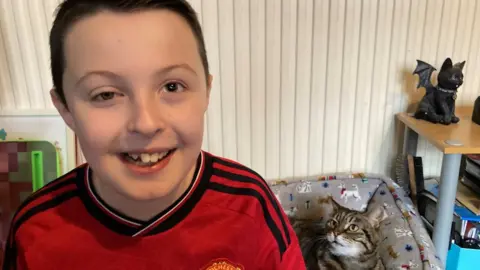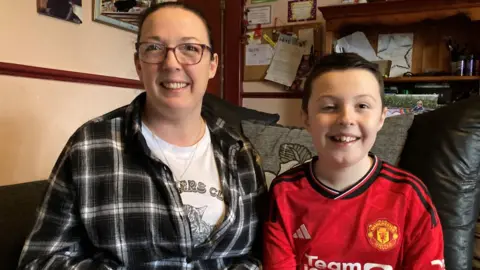Retinoblastoma: Leyland boy, 10, raises awareness of eye cancer charity
 BBC
BBCA 10-year-old boy who lost an eye after being diagnosed with a rare cancer is raising awareness about a charity to help others with the disease.
Sam from Leyland, Lancashire, was 18 months old when his family was told he had retinoblastoma (Rb).
Doctors at the Royal Preston Hospital found a tumour behind his right eye and soon afterwards he underwent a seven-hour operation to remove it.
He now hopes to raise money for the Childhood Eye Cancer Trust (CHECT).
The charity supports people affected by retinoblastoma, helping families cope with the diagnosis and funding research.
It said Rb develops in the cells of the retina and predominantly affects young children, mainly under the age of six.

Sam - who now wears an artificial eye - was recognised for his bravery by the charity who named him as their "CHECT Champion" last year after he urged children at his school to wear crazy glasses for a day in exchange for a donation.
About 40-50 cases are diagnosed in the UK every year - approximately one child a week.
Sam's mum, Nicky said: "We were bathing him one night and noticed he had a bit of a shadow over his right eye.
"We booked him in with the doctor and they could see he had a tumour."
She said years later it was not always obvious to people her son had an artificial eye, adding: "If people don't know, they don't know, they just think he's got a lazy eye because it's slightly lower but that's it."
Now Sam is a bit older, he can take his own eye out himself and clean it - and has even done this at school to show his friends.
"I've been called to school because he's taken it out after his friends asked him to,"his mum said.
Sam, who supports his local team Preston North End as well as Manchester United, is planning a football-themed fundraiser later this year,
Richard Ashton, chief executive of CHECT, said: "There are two centres treating children for eye cancer in the UK, in Birmingham and London. Once the cancer is diagnosed, treatment starts immediately.
"Life is turned upside down."
He added: "The doctors, nurses and clinical teams supporting retinoblastoma in the UK are some of the best in the world.
"I would hope that, while Rb will continue, the impacts will be somehow lessened a little bit."
The charity said survival rates for the cancer were very good, but many children would lose an eye.
It is normally first spotted when one eye appears different from the other, with a white glow, a squint, an absence of red-eye in a photograph or a change in eye colour.

Why not follow BBC North West on Facebook, X and Instagram? You can also send story ideas to [email protected]
